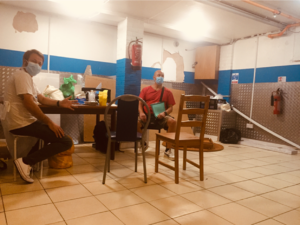Five minute read:
There is a long history of peer support work in addiction treatment services. Last month Julian Surey and colleagues published a qualitative study that focused on peer support workers delivering hepatitis C interventions. The SSA caught up with Julian Surey to find out more.
“Recently all of our peer support workers have been trained in COVID-19 testing and are now getting trained as non-clinical COVID-19 vaccinators.”
SSA: Your study focused on HepCare’s project use of peer support workers, can you explain a little bit about the project and about how peer support workers were involved?
Julian Surey: “So, we’ve been working with peer support workers for years now at Find&Treat. HepCare was an EU funded project that does community testing and linkage to care for Hep C among underserved populations and marginalised groups.”

“The Find&Treat team is an NHS, community based, outreach testing service. And we’ve had a strong peer component for a number of years. It started off as the TB [tuberculosis] team and has evolved over the years. We’ve a mobile health unit that goes out and does chest x-rays in homeless populations. Over the years we’ve latched other services on top of it; so, we’ve got some Hep B vaccines, we’ve got flu vaccines on it, we’ve got the Hep C funded work on it.”
“We’ve always had a strong peer support component, out of the wider team, of 15-20 I’d say that more than a third have got lived experience and that there’s a breadth. Some people have been through the hostel and homeless setting, a couple of guys have been through re-hab. We’ve got one person from west Africa who came through the asylum and immigration system. You know the real breadth of proper lived experience, linked in with a load of nurses like me.”
What kind of clinical roles did the peer support workers end up providing?
“For Hep C there’s a whole load of stuff you need to do to start treatment. In the UK we still have this strong structure of the referral process, but once you get to the tablets, they’re very easy to take and there are very few side effects. A lot of peers have traditionally been used as awareness raising working alongside clinical teams as an adjunct. But we train them to do both the awareness stuff like “hey dude you need to get tested you’re at risk” as well as training them to do the point of care tests.”
“They’re trained to do the second stage of getting the blood sample and a liver scan. They’re trained to do the referral to get them to a clinic, wherever that is. They’re trained to deliver treatment support – so they’ll support the client through treatment and at the end to confirm they’ve been cured. So, they go across the whole cascade of care.”
“Recently all of our peer support workers have been trained in COVID-19 testing and are now getting trained as non-clinical COVID-19 vaccinators.”
“They’ve got NHS badges which is great and they’ve got honorary contracts. And as we say in the paper they are central to the clinical team. And they fly. I kind of get all protective of them, but they just fly – they’re great – some take longer than others and you have to work within the competencies and what they are happy to do.”
“They can do all that clinical nurse stuff which we use long words for. For example, the liver scanner machine is called a transient elastography! It’s the liver wobbly test machine. So, you put it on your skin, it’s guided by ultrasound, you press a button and it tests how wobbly your liver is. And if your liver is nice and wobbly it’s healthy, if it’s really hard then it’s not. Or you can say it’s transient elastography and that you’ve got a cirrhotic or fibrotic liver and you’ve lost them. In this situation with our client group peer support workers are prefect for sitting across that and bridging that divide.”
“There’s a level of trust that our peer support workers can have with patients that I can’t have”


Images by Hannah Story – used with thanks
What are the other benefits to service users from having peer mentors?
“We did another paper a while ago and it’s just that there is a level of trust with the patients that medics often don’t get. Very early on I remember dealing with a patient who was really happy that we found him, we tested him, he was an injecting drug user, but he presumed he was clean. He was quite surprised he was positive [for Hepatitis C], many are expecting it, but he was quite surprised. We referred him for treatment, and he was very grateful. But his first appointment was awful – he phoned me up and was in bits, and was like “I wish I’d never got tested, the guy was blaming me for my condition and saying that drugs are expensive and I’m not worth it”. We worked with him a bit more and referred him to somewhere else and he was very happy. Of course, not all doctors are like that. But there’s a level of trust that our peer support workers can have with patients that I can’t have.”
You mentioned in the paper about people building critical resilience. Can you say a bit more about that?
“So, it’s an evolution from becoming a peer. I would like not to have to use that ‘peer’ label. We’re calling them advanced peer support workers, but we should call them specialist outreach workers, rather than them always being dragged back to their history. But there’s a progression of their training and their confidence that they can start digesting their previous experience in that context as well. If they’re dealing with the barriers that they may have faced, then it’s a process that helps them become more resilient in their recovery. I think it’s part of them being able to use their experience to reinforce their own recovery.”
Where should people look if they want to know about the work you are doing with HepCare and the van as well about using peer support workers in treatment?
“For the peer support workers, we’ve often used Groundswell, a peer advocacy organisation and they’re an excellent resource. Every 6 months they train a load of people that are relatively recently out of homeless settings or drug and alcohol problems. They can keep their benefits and work on a voluntary basis but they get a phone paid for, a travel card etc. They complete a basic set of training and then they move on and they get support elsewhere. And it’s part of their process of getting out. Groundswell are a great resource in the UK and will happily share their learning.”
“For the Hep C stuff we’ve used the Hepatitis C Trust, they have a similar model of using people with an experience of Hep C. So those two organisations in the UK are very happy to share information and obviously ourselves [Find&Treat] as well.”
The opinions expressed in this post reflect the views of the author(s) and do not necessarily represent the opinions or official positions of the SSA.
The SSA does not endorse or guarantee the accuracy of the information in external sources or links and accepts no responsibility or liability for any consequences arising from the use of such information.

